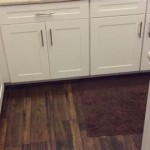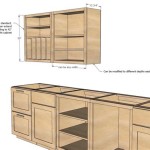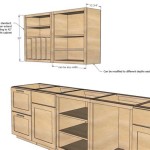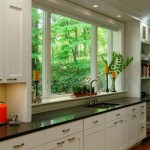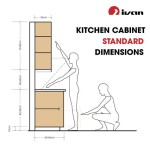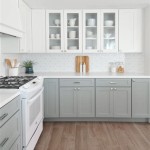What Is Depth of Kitchen Cabinets?
The depth of kitchen cabinets is a critical factor in determining the functionality and aesthetics of any kitchen. It refers to the measurement from the front edge of the cabinet door to the back wall of the cabinet. Choosing the right depth is crucial for creating a comfortable and efficient kitchen environment.
The standard depth for kitchen cabinets is typically 12 inches, but variations exist depending on factors such as the layout of the kitchen, the size of the appliances, and personal preferences. Understanding the different depths available and their implications for the kitchen design is essential for making informed decisions.
Standard Kitchen Cabinet Depth
The most common cabinet depth is 12 inches, providing ample storage space for most kitchen items. This depth is often chosen for its versatility and ability to accommodate a variety of cabinet styles, including base cabinets, wall cabinets, and upper cabinets. A 12-inch depth allows for comfortable access to contents and can be adapted to different kitchen layouts.
However, it's essential to consider the overall kitchen size and layout when selecting a standard 12-inch depth. In smaller kitchens, this depth may feel overwhelming and consume valuable space. In larger kitchens, it can provide ample storage without sacrificing counter space.
Shallow Kitchen Cabinet Depth
Shallow cabinets, typically ranging from 9 to 11 inches in depth, are an excellent option for smaller kitchens or spaces with limited floor space. This depth can create a more spacious feel and minimizes the visual impact of the cabinets. Shallow cabinets are particularly suitable for wall cabinets in kitchens with low ceilings, where a standard 12-inch depth might make the space feel cramped.
However, shallow cabinet depths may limit the storage capacity, particularly for items like pots and pans. It's crucial to consider the space requirements for your kitchenware and ensure that the chosen cabinet depth can accommodate them.
Deep Kitchen Cabinet Depth
Deep cabinets, exceeding 12 inches in depth, offer maximum storage capacity and can be an ideal choice for kitchens with limited floor space or individuals with a large collection of kitchenware. A deeper cabinet can accommodate larger items, such as baking sheets or platters, and offer a more organized storage solution.
However, deep cabinets can create challenges in accessing items stored towards the back. When considering deep cabinets, it's crucial to incorporate features like pull-out shelves or drawer systems to make the contents easily accessible. Additionally, deep cabinets can make the kitchen space feel smaller and claustrophobic if not designed with proper consideration for the overall kitchen layout.
Factors To Consider When Choosing Cabinet Depth
The choice of cabinet depth depends on various factors, including:
- Kitchen size and layout: The overall size of the kitchen and the placement of appliances can affect the optimal cabinet depth. Smaller kitchens may benefit from shallower cabinets, while larger kitchens allow for deeper cabinets.
- Storage requirements: Consider the quantity and size of items to be stored. If you have a large collection of kitchenware, deep cabinets may be necessary.
- Personal preferences: Some individuals prefer shallower cabinets for a more minimalist look, while others may prefer deeper cabinets for maximum storage capacity.
- Accessibility: When choosing deeper cabinets, ensure that you can easily access items in the back. Consider incorporating features like pull-out shelves or drawer systems to improve accessibility.
- Budget: Deeper cabinets generally cost more than shallower cabinets due to the increased materials and manufacturing.
By carefully considering these factors, you can make an informed decision about the optimal cabinet depth for your kitchen, ensuring both functionality and aesthetics.

What Is The Standard Depth Of A Kitchen Cabinet Dimensions Cabinets Height Wall Units

Kitchen Cabinet Depth 2024 Upper Cabinets Dimensions Wall

Kitchen Cabinet Sizes What Are Standard Dimensions Of Cabinets

Kitchen Cabinet Dimensions

3 Types Of Kitchen Cabinets Size Dimensions Guide Guilin

Standard Kitchen Counter Depth Hunker Cabinet Dimensions Cabinets Height

Proper Depth For Frameless Cabinets
Guide To Kitchen Cabinet Sizes And Dimensions

N Standard Kitchen Dimensions Renomart

Standard Kitchen Cabinet Sizes And Dimensions Guide
Related Posts

